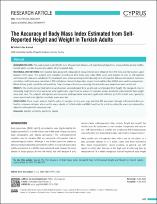| dc.contributor.author | Kamuk, Yetkin Utku | |
| dc.date.accessioned | 2023-01-26T08:16:08Z | |
| dc.date.available | 2023-01-26T08:16:08Z | |
| dc.date.issued | 2022 | en_US |
| dc.identifier.citation | Kamuk, Y. U. (2022). The Accuracy of Body Mass Index Estimated from Self-Reported Height and Weight in Turkish Adults. Cyprus J Med Sci 2022;7(5):669-677 | en_US |
| dc.identifier.issn | 2149-7893 | |
| dc.identifier.issn | 2536-507X | |
| dc.identifier.uri | http://dx.doi.org/10.4274/cjms.2020.2017 | |
| dc.identifier.uri | https://hdl.handle.net/11491/8423 | |
| dc.description.abstract | BACKGROUND/AIMS: This study aimed to identify the level of agreement between self-reported and objectively measured data among healthy Turkish adults in order to assess the validity of self-reported data. MATERIALS AND METHODS: Self-reported data along with independent measurements were obtained from 958 men and 502 women, aged between 18-53 years. The subjects were classified according to their body mass index (BMI) scores and margins of error in self-reported anthropometric data were calculated. The misclassification status according to BMI deriving from self-reported data was determined. Intraclass correlation coefficients were calculated at 95% confidence interval. Independent sample t-test and One-Way ANOVA were used for comparisons. Bland-Altman graph, specificity and sensitivity, Cohen’s kappa and receiver operating characteristic curve inspections were carried out. RESULTS: The results indicate that both men and women underestimated their weight and overestimated their height. The margin of error in estimating height for the men was found to be significantly larger than for women. In contrast, women tended to underestimate their weight more than men. The subjects’ self-reported and measured anthropometric data were significantly different (p<0.01) in both sexes. Specificity
scores were found to be high but sensitivity scores were low.
CONCLUSION: These results indicate that the subjects’ margins of error were large and that BMI assessment through self-reported data can
lead to erroneous estimates when used to assess obesity in Turkish adults and BMI should not be relied on unless the scores are obtained by
objective anthropometric measurements. | en_US |
| dc.language.iso | eng | en_US |
| dc.publisher | GALENOS PUBL HOUSE | en_US |
| dc.relation.ispartof | CYPRUS JOURNAL OF MEDICAL SCIENCES | en_US |
| dc.rights | info:eu-repo/semantics/openAccess | en_US |
| dc.rights | Attribution 4.0 International (CC BY 4.0) | * |
| dc.rights.uri | https://creativecommons.org/licenses/by/4.0/ | * |
| dc.subject | Validity | en_US |
| dc.subject | Sensitivity | en_US |
| dc.subject | Specificity | en_US |
| dc.subject | Obesity | en_US |
| dc.title | The Accuracy of Body Mass Index Estimated from SelfReported Height and Weight in Turkish Adults | en_US |
| dc.type | article | en_US |
| dc.department | Hitit Üniversitesi, Spor Bilimleri Fakültesi, Antrenörlük Eğitimi Bölümü | en_US |
| dc.authorid | 0000-0001-5976-7503 | en_US |
| dc.identifier.volume | 7 | en_US |
| dc.identifier.issue | 5 | en_US |
| dc.identifier.startpage | 669 | en_US |
| dc.identifier.endpage | 677 | en_US |
| dc.relation.publicationcategory | Makale - Uluslararası Hakemli Dergi - Kurum Öğretim Elemanı | en_US |
| dc.identifier.doi | 10.4274/cjms.2020.2017 | en_US |
| dc.description.wospublicationid | WOS:000886060300017 | en_US |




















